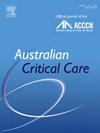Critical care nurses’ prioritisation of patient care, including delirium prevention and management strategies: A mixed-method study
IF 2.6
3区 医学
Q2 CRITICAL CARE MEDICINE
引用次数: 0
Abstract
Background
Delirium is a common issue in critical care, yet its prevention and management strategies are often inconsistent. Understanding the factors that lead to the omission or delay in delirium-related care by critical care nurses is essential for enhancing patient outcomes.
Objectives
This study aimed to identify the specific delirium-related prevention and management strategies that are frequently missed or delayed by critical care nurses. It also explored factors influencing nurses’ prioritisation of care, including delirium-related strategies.
Methods
A mixed-method approach was utilised, combining quantitative data from online surveys and qualitative insights from interviews with critical care nurses in a Canadian health authority. The Missed Nursing Care Survey identified instances of missed or delayed care, while interviews provided deeper insights into care prioritisation decisions.
Results
Quantitative findings indicated frequent delays in patient mobilisation and physical care that were attributed to staffing shortages, high patient volume, and increased admissions and discharges. Qualitative findings revealed that factors such as patient acuity, structured routines, knowledge gaps, limited support, unit culture, and resource inadequacies influenced the prioritisation of delirium-related care, often leading to its inadvertent deprioritisation.
Conclusion
This study underscores the need to integrate delirium care into patient acuity assessments and establish sustainable education programs to enhance the recognition and prioritisation of delirium by critical care nurses. Addressing these factors is critical for improving patient outcomes in critical care settings.
Implications for clinical practice
Strengthening critical care nurses’ capacity to consistently recognise and prioritise delirium-related care through targeted education and system-level support could potentially contribute to better patient outcomes.
重症护理护士对病人护理的优先顺序,包括谵妄预防和管理策略:一项混合方法研究。
背景:谵妄是重症监护的常见问题,但其预防和管理策略往往不一致。了解导致重症监护护士遗漏或延误谵妄相关护理的因素对于提高患者预后至关重要。目的:本研究旨在确定谵妄相关的具体预防和管理策略,经常被疏忽或延误的重症监护护士。它还探讨了影响护士护理优先级的因素,包括谵妄相关策略。方法:采用混合方法,结合在线调查的定量数据和加拿大卫生当局重症监护护士访谈的定性见解。错过护理调查确定了错过或延迟护理的实例,而访谈为护理优先级决策提供了更深入的见解。结果:定量研究结果表明,由于人员短缺、患者数量大、入院和出院人数增加,患者动员和身体护理经常出现延误。定性研究结果显示,患者的敏度、结构化的常规、知识差距、有限的支持、单位文化和资源不足等因素影响谵妄相关护理的优先级,往往导致其无意中被剥夺优先级。结论:本研究强调需要将谵妄护理纳入患者的敏锐度评估,并建立可持续的教育计划,以提高重症监护护士对谵妄的认识和优先考虑。解决这些因素对于改善重症监护环境中的患者预后至关重要。对临床实践的启示:通过有针对性的教育和系统层面的支持,加强重症监护护士持续识别和优先考虑谵妄相关护理的能力,可能有助于改善患者的预后。
本文章由计算机程序翻译,如有差异,请以英文原文为准。
求助全文
约1分钟内获得全文
求助全文
来源期刊

Australian Critical Care
NURSING-NURSING
CiteScore
4.90
自引率
9.10%
发文量
148
审稿时长
>12 weeks
期刊介绍:
Australian Critical Care is the official journal of the Australian College of Critical Care Nurses (ACCCN). It is a bi-monthly peer-reviewed journal, providing clinically relevant research, reviews and articles of interest to the critical care community. Australian Critical Care publishes peer-reviewed scholarly papers that report research findings, research-based reviews, discussion papers and commentaries which are of interest to an international readership of critical care practitioners, educators, administrators and researchers. Interprofessional articles are welcomed.
 求助内容:
求助内容: 应助结果提醒方式:
应助结果提醒方式:


